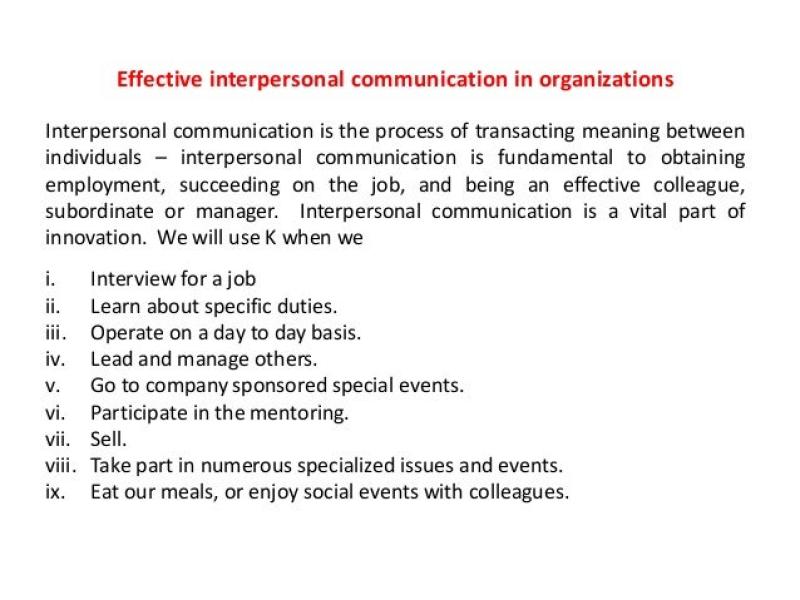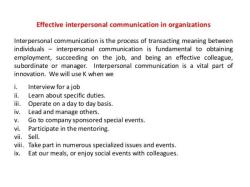What is the importance of interpersonal communication?
Interpersonal communication plays a crucial role in various aspects of our lives, influencing relationships, personal development, and societal interactions. Here are key insights into the significance of interpersonal communication:
Building and Maintaining Relationships:
- Interpersonal communication is essential for establishing and nurturing relationships. It involves expressing emotions, sharing thoughts, and creating connections with others. Effective communication strengthens bonds, whether in personal, professional, or social relationships.
Conflict Resolution:
- When conflicts arise, interpersonal communication provides a platform for expressing concerns, understanding perspectives, and finding resolutions. Clear and empathetic communication is vital for resolving disputes and maintaining harmony in relationships.
Personal Development:
- Interpersonal communication contributes to personal growth by allowing individuals to articulate their thoughts, feelings, and goals. Through self-expression and feedback from others, individuals can gain insights into their strengths and areas for improvement.
Workplace Collaboration:
- In professional settings, effective interpersonal communication is crucial for teamwork, collaboration, and organizational success. It facilitates the exchange of ideas, enhances coordination, and fosters a positive work environment.
Leadership and Influence:
- Strong interpersonal communication skills are often associated with effective leadership. Leaders who can convey their vision, listen to others, and inspire action through communication are more likely to succeed in influencing and motivating their teams.
Emotional Expression and Support:
- Interpersonal communication provides a channel for expressing emotions, seeking support, and offering comfort. Being able to communicate openly about one's feelings fosters emotional well-being and strengthens social connections.
Negotiation and Persuasion:
- Negotiation and persuasion are integral in various aspects of life, from business negotiations to everyday decision-making. Effective interpersonal communication skills contribute to successful negotiation and persuasion, allowing individuals to convey their ideas convincingly.
Enhancing Social Skills:
- Interpersonal communication is a fundamental component of social skills development. Through interactions with others, individuals learn to navigate social situations, understand social cues, and adapt their communication style to different contexts.
Cultural Understanding:
- In a globalized world, effective interpersonal communication is vital for understanding and appreciating cultural differences. Cross-cultural communication skills help bridge gaps, reduce misunderstandings, and promote inclusivity.
Information Exchange:
- Interpersonal communication is a primary means of exchanging information. Whether in personal conversations, educational settings, or professional interactions, conveying information accurately and comprehensibly is essential for effective communication.
Establishing Trust:
- Trust is a foundational element in relationships and collaborations. Interpersonal communication builds trust by fostering transparency, honesty, and reliability in interactions.
Problem Solving:
- Effective communication is central to problem-solving. It involves articulating issues, brainstorming solutions, and collaboratively working towards resolutions.
In summary, interpersonal communication is a multifaceted process that shapes our relationships, influences our personal and professional development, and contributes to the fabric of societal interactions. Developing strong interpersonal communication skills is an investment in building meaningful connections and navigating the complexities of human interaction.
Interpersonal communication, the exchange of information or ideas between two or more people, is a fundamental human activity that plays a crucial role in various aspects of our lives. It is the foundation for building and maintaining strong relationships, fostering collaboration and teamwork, and resolving conflicts constructively.
Significance of Interpersonal Communication
Interpersonal communication holds immense significance due to its far-reaching impact on our personal and professional spheres. Let's explore some key reasons why it is so important:
Building and Maintaining Relationships: Interpersonal communication is the cornerstone of building and maintaining strong relationships, whether they are personal friendships, romantic partnerships, or professional connections. Through effective communication, we can connect with others on an emotional level, share our thoughts and feelings, and gain a deeper understanding of their perspectives. This fosters trust, empathy, and mutual respect, which are essential ingredients for healthy and fulfilling relationships.
Collaboration and Teamwork: Effective interpersonal communication is crucial for successful collaboration and teamwork in various settings, including workplaces, educational institutions, and community projects. It enables individuals to share ideas, coordinate tasks, resolve disagreements, and work towards achieving common goals. Clear communication, active listening, and constructive feedback are key elements for fostering a collaborative environment and achieving shared objectives.
Conflict Resolution: Interpersonal communication plays a vital role in navigating conflicts constructively and finding mutually agreeable solutions. By engaging in open and honest communication, individuals can express their concerns, listen to opposing viewpoints, and work towards understanding each other's perspectives. Empathy, active listening, and a willingness to compromise are essential skills for resolving conflicts effectively and maintaining positive relationships.
Personal and Professional Growth: Interpersonal communication contributes significantly to personal and professional growth. Through meaningful interactions with others, individuals can learn from diverse experiences, gain new perspectives, and develop their communication skills. Effective interpersonal communication can lead to career advancement, stronger personal connections, and a broader understanding of the world around us.
Role of Interpersonal Communication in Human Interactions
Interpersonal communication permeates every aspect of human interaction, shaping our relationships, influencing our decisions, and defining our experiences throughout life. It plays a multifaceted role in shaping our interactions, including:
Verbal and Nonverbal Communication: Interpersonal communication encompasses both verbal and nonverbal cues. Verbal communication involves the use of spoken or written language to convey information or ideas, while nonverbal communication includes body language, facial expressions, tone of voice, and other nonverbal cues that convey emotions, attitudes, and intentions.
Emotional Connection and Understanding: Effective interpersonal communication goes beyond simply exchanging words; it involves establishing an emotional connection with others. By listening attentively, showing empathy, and expressing our own emotions, we can build rapport, foster understanding, and strengthen our relationships.
Context and Cultural Sensitivity: Interpersonal communication is context-specific, and it's crucial to be mindful of cultural differences and adapt our communication style accordingly. Understanding cultural norms, avoiding assumptions, and respecting diverse perspectives are essential for effective cross-cultural communication.
Effective Communication Skills: Interpersonal communication relies on a set of skills that can be developed and honed over time. These skills include active listening, clear and concise communication, constructive feedback, and conflict resolution strategies.
Impact on Personal and Social Well-being: Effective interpersonal communication has a positive impact on our personal and social well-being. It enhances our ability to form and maintain healthy relationships, fosters collaboration and teamwork, and contributes to a more harmonious and connected society.
In conclusion, interpersonal communication is a fundamental aspect of human interaction that plays a crucial role in shaping our relationships, influencing our decisions, and defining our experiences throughout life. By honing our communication skills, cultivating empathy and understanding, and adapting our communication style to different contexts, we can enhance our personal and professional lives, contribute to a more connected society, and navigate the complexities of human interaction with greater confidence and effectiveness.


